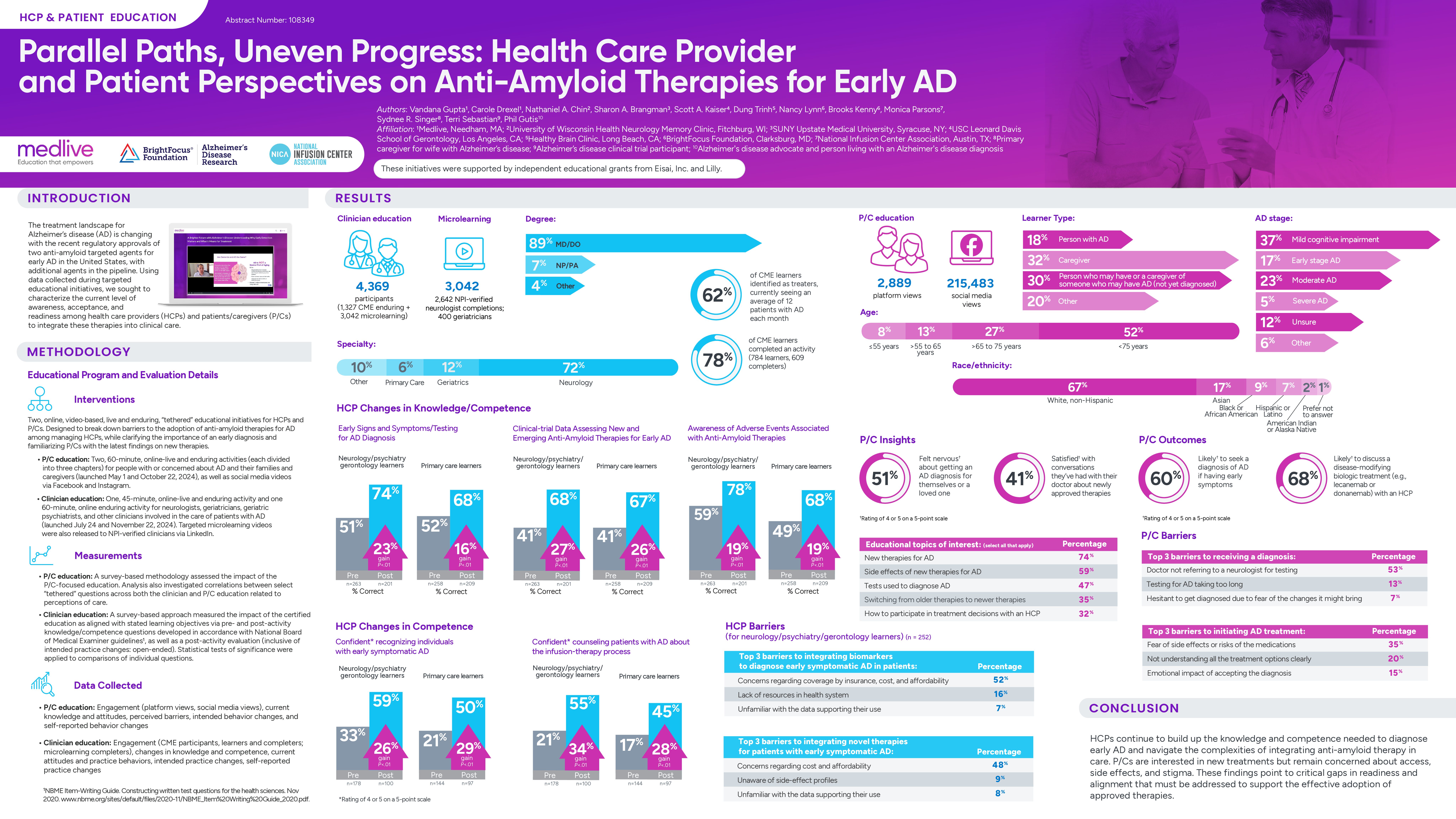
*This information was originally published as part of an abstract for Alzheimer’s Association International Conference®*
Understanding Alzheimer’s Disease (AD) and the Unmet Patient Need
The treatment landscape for Alzheimer’s disease (AD) is evolving with the approval of two anti-amyloid therapies for early-stage AD in the US, and more therapies are on the way. As clinical teams and caregivers prepare to integrate these therapies, research shows a critical need to boost awareness, acceptance, and readiness. This ensures that health care providers (HCPs) receive the necessary guidance to apply these innovations confidently and effectively in routine care and that patients and caregivers (P/Cs) are adequately prepared to engage in treatment-related discussions with their care teams.
The Medlive Approach
To help address this need, Medlive joined forces with BrightFocus Foundation and the National Infusion Center Association (NICA) to develop targeted digital education. The two initiatives featured in our poster presentation leveraged Medlive’s Tethered educational design, with each initiative featuring two live and on-demand video-based content tracks, one tailored to HCPs and the other to P/Cs, providing essential information about anti-amyloid therapies for early AD, including their benefits and common barriers to adoption.
The poster draws on insights generated, in part, through MedliveCME’s educational program, Biologic Therapies for Early Alzheimer’s Disease: Parsing the Impact on Aβ, Tau, Cognition, Function, and Defining Meaningful Benefit. This program, designed for healthcare professionals, provides an in-depth exploration of the evolving role of anti-amyloid therapies in early Alzheimer’s disease.
“Anti-amyloid therapies represent a major shift in Alzheimer’s care. But without education that reaches all stakeholders—especially patients and providers—these advancements risk falling short. Through our partnership with Medlive, we’ve been able to deliver timely, accessible, and evidence-based programs that empower decision-making across the care continuum. This collaboration is a model for how education can close the gap between innovation and real-world impact.”
– Brooks Kenny, BrightFocus Foundation
“Anti-amyloid therapies bring unique challenges to the infusion landscape, from safety monitoring to patient education. Our collaboration with Medlive helps ensure clinicians have the tools they need and patients can access these treatments with confidence, in settings that prioritize safety and equity.”
– Monica Parsons, NICA
The P/C programs included two 60-minute online-live and enduring activities (each divided into three chapters) launched via Medlive, together with social media videos shared via Facebook and Instagram, all designed for people with or concerned about AD.
The HCP programs included one 45-minute online-live and enduring activity and one 60-minute online enduring activity for neurologists, geriatricians, geriatric psychiatrists, and other clinicians involved in the care of patients with AD. Targeted microlearning videos were also released to NPI-verified clinicians via LinkedIn.
Program Goals
The patient program aimed to help P/Cs understand the importance of recognizing early symptoms and when to seek a diagnosis. It also aimed to better familiarize them with the latest findings on new therapies and how to advocate for themselves in discussions with their care team.
The HCP program focused on enhancing clinicians’ understanding of the evolving Alzheimer’s treatment landscape, including the rationale and evidence behind anti-amyloid therapies. It demonstrated how to apply new data to clinical decision-making, improving early diagnosis, and supporting informed, collaborative treatment planning with P/Cs.
Data Analysis
The program saw 4,369 learners participate in the clinician-directed education and 2,889 learners view the P/C-directed education.
Key takeaways from the analysis include:
- Patient Empowerment: At baseline, 74% of P/Cs indicated strong interest in learning about newly approved Alzheimer’s therapies but only 41% felt satisfied with their treatment conversations—revealing a critical communication gap. After viewing the education, 68% reported they were likely to initiate discussions with their provider about disease-modifying options, demonstrating substantial gains in both confidence and readiness to act.
- Clinician Knowledge Improvement: Before the program, fewer than half of the neurology and primary care learners were familiar with the latest anti-amyloid trial data. After completing the 4-item assessment tied to the learning objectives, neurology learners improved from 41% to 68%, and primary care learners from 41% to 67%, reflecting 27- and 26-point gains respectively.
Conclusion – Collaborating for Improved Patient Outcomes
These findings highlight the crucial role of education in closing knowledge gaps, overcoming barriers, and empowering both clinicians and patients to make informed treatment decisions. By improving awareness and confidence in individualized dosing strategies for AD, we can enhance patient care and outcomes.
These initiatives were supported by independent educational grants from Eisai, Inc. and Lilly.
Clinical Insights from AAIC
At this year’s Alzheimer’s Association International Conference® (AAIC), our Medical Directors, Vandana Gupta, MSc and Carole Drexel, PhD, brought forward critical updates shaping the future of Alzheimer’s disease research, diagnosis, and care. Here are their key takeaways from the meeting:
Blood-Based Biomarker Guidelines Released
The Alzheimer’s Association issued its first clinical practice guideline supporting the use of blood-based biomarkers (≥90% sensitivity, ≥75% specificity) to aid in diagnosing Alzheimer’s disease in specialty memory clinics. This offers a less invasive, more accessible path to early diagnosis.
U.S. POINTER Trial: Lifestyle Intervention Helps Preserve Cognition
A large Phase 3 trial in older adults at risk showed both structured and self-guided lifestyle programs—focused on diet, exercise, cognitive training and peer support—helped improve cognition over two years, with the structured version yielding stronger effects. This reinforces multimodal, prevention-focused interventions that include lifestyle modification as a viable pathway to preserve cognition.
Lecanemab 4-Year Data
Four-year follow-up from the Clarity AD open-label extension showed a 1.75-point slower cognitive decline vs. expected progression; subcutaneous (SC) dosing now shown to be comparable to IV. This confirms long-term clinical benefit and introduces a more convenient SC maintenance option.
Non-Amyloid Pipeline Expands
Advances in tau-targeting agents, oral neurogenic therapies, GLP-1s, and personalized NK-cell immunotherapy were featured. Signals a critical expansion beyond amyloid, toward combination approaches targeting multiple AD mechanisms like tau, neuroinflammation, and synaptic repair.
Advancing Research on Caregiving & Health Equity
Dedicated sessions highlighted caregiver burden, stress, and support needs, alongside the role of social determinants of health in shaping dementia outcomes. These presentations reflect a growing commitment to inclusive, caregiver-centered, and equity-focused research.
Donanemab Long-Term Extension Data
In the long-term extension of the Phase 3 TRAILBLAZER-ALZ 2 trial, donanemab demonstrated reduced cognitive decline by 0.6 points at 18 months and 1.2 points at 36 months on the CDR-Sum of Boxes in early Alzheimer’s patients, with early treatment lowering progression risk by 27% and over 75% achieving amyloid clearance within 76 weeks. Early use of donanemab can meaningfully slow disease progression, highlighting the long-term value of starting treatment sooner.
These advances, from new diagnostic guidelines and prevention strategies to expanding treatment options and prioritizing health equity, reflect the multi-front progress in Alzheimer’s research. At Medlive, we’re committed to helping clinicians, caregivers, and patients turn these scientific breakthroughs into better, more equitable outcomes through education, expert collaboration, and patient-centered resources.
If you’d like to learn more about our other Alzheimer’s outcomes, we invite you to view these posters:
To learn more about partnering with Medlive to develop impactful CME programs, reach out via our Contact Us page.




